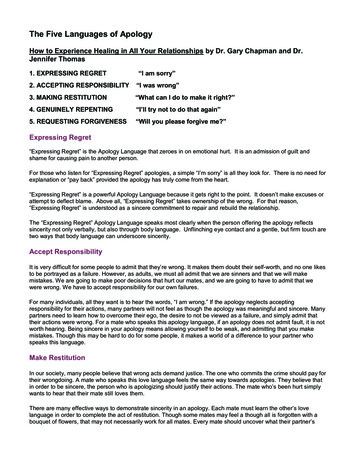
Transcription
The Five Languages of ApologyHow to Experience Healing in All Your Relationships by Dr. Gary Chapman and Dr.Jennifer Thomas1. EXPRESSING REGRET“I am sorry”2. ACCEPTING RESPONSIBILITY“I was wrong”3. MAKING RESTITUTION“What can I do to make it right?”4. GENUINELY REPENTING“I’ll try not to do that again”5. REQUESTING FORGIVENESS“Will you please forgive me?”Expressing Regret“Expressing Regret” is the Apology Language that zeroes in on emotional hurt. It is an admission of guilt andshame for causing pain to another person.For those who listen for “Expressing Regret” apologies, a simple “I’m sorry” is all they look for. There is no need forexplanation or “pay back” provided the apology has truly come from the heart.“Expressing Regret” is a powerful Apology Language because it gets right to the point. It doesn’t make excuses orattempt to deflect blame. Above all, “Expressing Regret” takes ownership of the wrong. For that reason,“Expressing Regret” is understood as a sincere commitment to repair and rebuild the relationship.The “Expressing Regret” Apology Language speaks most clearly when the person offering the apology reflectssincerity not only verbally, but also through body language. Unflinching eye contact and a gentle, but firm touch aretwo ways that body language can underscore sincerity.Accept ResponsibilityIt is very difficult for some people to admit that they’re wrong. It makes them doubt their self-worth, and no one likesto be portrayed as a failure. However, as adults, we must all admit that we are sinners and that we will makemistakes. We are going to make poor decisions that hurt our mates, and we are going to have to admit that wewere wrong. We have to accept responsibility for our own failures.For many individuals, all they want is to hear the words, “I am wrong.” If the apology neglects acceptingresponsibility for their actions, many partners will not feel as though the apology was meaningful and sincere. Manypartners need to learn how to overcome their ego, the desire to not be viewed as a failure, and simply admit thattheir actions were wrong. For a mate who speaks this apology language, if an apology does not admit fault, it is notworth hearing. Being sincere in your apology means allowing yourself to be weak, and admitting that you makemistakes. Though this may be hard to do for some people, it makes a world of a difference to your partner whospeaks this language.Make RestitutionIn our society, many people believe that wrong acts demand justice. The one who commits the crime should pay fortheir wrongdoing. A mate who speaks this love language feels the same way towards apologies. They believe thatin order to be sincere, the person who is apologizing should justify their actions. The mate who’s been hurt simplywants to hear that their mate still loves them.There are many effective ways to demonstrate sincerity in an apology. Each mate must learn the other’s lovelanguage in order to complete the act of restitution. Though some mates may feel a though all is forgotten with abouquet of flowers, that may not necessarily work for all mates. Every mate should uncover what their partner’s
main love language is (Words of Affirmation, Quality Time, Acts of Service, Physical Touch, and Receiving Gifts)and use that specific language in order to make restitutions in the most effective way.For a mate whose primary apology language is making restitutions, no matter how often you say “I’m sorry”, or “Iwas wrong”, your mate will never find the apology sincere. You must show strong efforts for making amends. Agenuine apology will be accompanied by the assurance that you still love your mateand have a desire to right the wrong-doings committed.Genuinely RepentFor some individuals, repentance is the convincing factor in an apology. Some mates will doubt the sincerity of anapology if it is not accompanied by their partner’s desire to modify their behavior to avoidthe situation in the future.It’s important to remember that all true repentance begins in the heart. A mate must feel poorly for hurting theirloved one, and rely on God’s help in order to truly change. Admitting you are wrong creates vulnerability. It allowsyour mate to get a glimpse of your heart. The glimpse of true self is assurance that the apology was sincere.One important aspect of genuinely repenting is verbalizing your desire to change. Your mate cannot read yourmind. Though you may be trying to change inside, if you do not verbalize your desire to change to your mate, mostlikely they will still be hurt.Many people have problems with repenting when they do not feel as though their actions were morally wrong.However, in a healthy relationship, we often make changes that have nothing to do with morality and everything todo with building a harmonious marriage.It is also important to make a dedicated plan for change. Often apologies involving repentance fail because theperson never set up steps of action to help ensure success. A person must first set goals for their change. After youcreate realistic goals, then you can start implementing a plan to change. Taking baby steps towards repentanceinstead of insisting on changing all at once will increase your chances of successfully changing your ways.It is important to remember that change is hard. Constructive change does not mean we will immediately besuccessful. There will be highs and lows on the road to change. You must remember that with God’s help, anyonecan change their ways if they are truly and genuinely ready to repent.Request ForgivenessIn some relationships, a mate wants to hear their partner physically ask for forgiveness. They want assurance thattheir mate recognizes the need for forgiveness. By asking forgiveness for their actions, a partner is really askingtheir mate to still love them. Requesting forgiveness assures your mate that you want to see the relationship fullyrestored. It also proves to your mate that you are sincerely sorry for what you’ve done. It shows that you realizeyou’ve done something wrong. Requesting forgiveness also shows that you are willing to put the future of therelationship in the hands of the offended mate. You are leaving the final decision up to your partner – to forgive ornot forgive.Requesting forgiveness is not easy. It often leaves one vulnerable to the fear of rejection. Along with the fear ofrejection is the fear of failing. Many people have a hard time seeking forgiveness because it means admitting thatyou have failed. The only way to overcome this fear is to recognize that it is very common amongst mankind. Thecommonality makes it okay to be a failure. It allows a stubborn mate to apologize to their partner and become ahealthy individual.Ultimately, it’s important to remember that there is a difference between asking for forgiveness and DEMANDINGforgiveness. When we demand forgiveness, we tend to forget the nature of forgiveness. Forgiveness is a choice theoffended party is supposed to make. Demanding forgiveness takes away the sincerity of asking for it.Remember not to treat forgiveness lightly. It is something to be cherished and appreciated. The act of forgivenessis hard on both ends – for the person who’s asking and for the person who’s accepting.
APOLOGY LANGUAGES PERSONAL PROFILELANGUAGESOF APOLOGYTo Get Started:Some of the possible responses to each of the 20 scenarios are similar. Focus less on their similarity and moreon choosing the response that most appeals to you, and then move on to the next item. Allow 10 to 15 minutes tocomplete the profile. Take it when you are relaxed, and try not to rush through it. When you have completed all 20,add up the number of each letter from A- E and put results in the appropriate blank at the end of the profile.123Your spouse failed to acknowledge your wedding anniversary.(If you are not married, assume you are in this scenario.)He/she should say:A“I can’t believe I forgot. You and our marriage are soimportant to me. I am so sorry.”B“There is no excuse for me forgetting. What wasI thinking?”C“What can I do to prove my love for you?”D“You can bet I won’t forget next year! I’m going to circlethe date on my calendar!”E“I know you are hurt, but can you everforgive me?”Your mother knew how you felt about a matter and knowinglywent against your wishes. She should say:A“I knew how you felt but went against your wishesanyway. I wish I had not done that.”B“If I had only thought about what I was doing, I wouldhave realized it was wrong.”C“What can I do to regain your respect?”D“I won’t take your feelings for granted in the future.”E“Will you please give me another chance?”You were in a crisis and needed help, but your friend ignoredyour need. He/she should say:A“I should have been there for you. I’m so sorry I letyou down.”B“I let you down when you needed me the most. I made aterrible mistake.”C“Saying ‘I’m sorry’ doesn’t feel like it is enough. Whatmore can I say or do to mend our friendship?”D“I realize now that I could have been more help to you, andI promise that I’ll do everything I can do to help you if everyou are in trouble again.”E“I am sincerely sorry and ask you to forgive me.”456Your sister made an insensitive remark about you.She should say:A“That was so thoughtless of me. I wish I had been moreconsiderate of your feelings.”B“I know what I said was wrong and that I hurt your feelings.”C“Would you allow me to retract what I said? I would like achance to restore your reputation.”D“While I will likely say wrong things again in the future,what I’ve learned from this experience will help me avoidhurting you with insensitive comments.”E“I blew it! Can you forgive me?”Your spouse lashed out in anger against you when you haddone no apparent wrong. He/she should say:A“I wish I had not hurt you by yelling at you. I feel so bad forhow I treated you.”B“I was angry, but I had no right to speak to you that way.You did not deserve that.”C“What can I do or say to make things right between us?”D“I’m afraid that I’ll do this again, and I don’t want to. Helpme think of ways to avoid blowing up like this inthe future.”E“I am truly sorry for yelling at you. I hope that you can findit in your heart to forgive me.”You were proud of your accomplishment, but your friendacted as if it was trivial. He/she should say:A“You needed me to share your excitement, and I let youdown. I hate that I didn’t respond more appropriately.”B“I spoiled your celebration by not being happy for you. Icould make excuses, but really, I have no good excuse forignoring your achievement.”C“Is it too late for us to celebrate your accomplishment? Ireally want to make this up to you.”D“I promise I’ll notice and celebrate your accomplishmentsin the future. I’ve learned a hard lesson.”E“I know I failed you before, but will you please forgive me again?”NEXT
APOLOGY LANGUAGES PERSONAL PROFILE789Your business partner failed to consult with you on animportant matter of mutual interest. He/she should say:A“I know now that I hurt you very badly. I am truly sorryfor what I did.”B“I really blew it this time. I was wrong to not include you inthis decision. You have a right to be upset with me.”C“Is there anything I can do to make up for what I did?”D“In the future, I plan to consult with you no matter what. Iwon’t bypass you in making decisions again.”E“You have every right to hold this against me, but will youplease forgive me?”A coworker unintentionally poked fun at you andembarrassed you in front of others in your workplace. He/sheshould say:A“I deeply regret embarrassing you like I did. I wish I couldgo back in time and say something more appropriate.”B“That was so thoughtless of me. I thought I was beingfunny, but obviously, hurting you like I have is not funny.”C1011LANGUAGESOF APOLOGYYour brother learned that he had previously been wrong about asignificant point of conflict between the two of you. He should say:A“I am upset with myself over how I handled ourdisagreement. My behavior threatened our relationshipand that scares me. I regret the way I acted.”B“I admit that I was wrong. If I had only known then what Iknow now, I could have saved us a lot of heartache.”C“What can I do to mend our relationship? I feel like I needto do or say something to restore your respect for me.”D“If we disagree over an issue in the future, I plan ongathering all the facts before I make any judgments. Thatmay save us from unnecessary arguing.”E“I apologize. Will you please forgive me?”Although you had expressed your annoyance with a particularhabit many times before, your spouse continued exhibitingthe behavior to spite you. He/she should say:A“I’ve taken this too far. I’m very sorry for not being moreconsiderate of your wishes. I wouldn’t like it if you did thatto me.”“Is there any way I can repair our relationship? Would youlike for me to apologize to you in front of the staff?”B“OK, I admit it; I am annoying you on purpose, and that’sneither funny nor fair. I need to act more mature than that.”D“It’s easy to take others’ feelings for granted, but I want tobe more considerate of you and others in the future. Willyou help hold me accountable?”C“Saying ‘I’m sorry’ won’t take back the fact that I’veknowingly tried to annoy you. What more can I do to winback your favor?”E“I didn’t intend to hurt you, and now all I can do is ask foryour forgiveness and try not to repeat my samemistake again.”D“I have gotten into the habit of disregarding your wishes,and I don’t want to go on doing that. From now on, I’mgoing to make extra effort to honor your wishes.”E“I’ve tried your patience, and now I’m asking you to forgiveme. Will you allow me a fresh start in honoring your requests?”You were trying to tell your friend something important, andhe/she acted disinterested. He/she should say:A“I feel really bad that I didn’t listen to what you weresaying. I know how it feels to have something importantto say, and I regret that I didn’t listen to you.”B“Listening is such an important part of a strongrelationship, but once again, I blew it. You needed me tohear you, and I basically just ignored your need.”C“Can we back up and try again? You talk, and I’ll listen.You’ll have my undivided attention.”D“I messed up this time, but in the future, I promise togive you my full attention when you say you havesomething important to tell me.”E“I’m sorry I wasn’t listening. You don’t have to forgive me,but I hope you will.”12Your father gave you the “silent treatment” as a way of makingyou feel guilty about something on which the two of youdisagreed. He should say:A“You are an adult, and I feel really bad about controlling yourdecisions. I don’t want to risk damaging our relationship.”B“There is no denying that I’m guilty. I should have handledthe situation with more fairness and honesty.”C“I would like to make this up to you somehow, and I want tokeep talking with you. May I take you out to dinner?”D“In the future, I’m going to be more honest about how I feelwithout trying to make you feel guilty for not agreeing with me.”E“It’s your choice, but I really do hope you will forgive me.”NEXT
APOLOGY LANGUAGES PERSONAL PROFILE13A business associate broke a promise and caused you to missan important deadline. He/she should say:AA“I can’t believe I blamed you like I did. I reallyam embarrassed about my behavior, and I’m sorry.”B“I had just as much to do with the failure of this project asyou or anyone else. I should have admitted myshortcomings.”“I’ve really messed up this time. You missed your deadlinebecause of me.”C“I don’t know what I can do at this point, but is thereany way I can compensate you for my part in yourmissed deadline?”C“It’s too late to do anything about it now, but I want sobadly to avoid this type of error again. Let’s talk aboutwhat I can do in the future to make good on my promises.”“There is no excuse for my behavior, and the only way I’mgoing to feel remotely better is to make this right betweenus. What do you need me to do or say?”D“I don’t expect you to forgive me considering the troubleI’ve caused you, but I would greatly appreciate it if youwould forgive me.”“I’m either going to learn how to treat my team membersmore appropriately, or I’m not going to lead any morecommittees. I want to grow from this experience.”E“Please forgive me. I was wrong to blame you, and I praythat you will forgive me.”EYour neighbor asked you to wait on him/her outside the arena,but he/she never showed up for the concert. He/she should say:ABC1516A church member blamed you with sole responsibilityfor the failure of a committee project although he/she sharedleadership duties of the committee. He/she should say:BD14“I am so sorry. I promised you I’d come through, and I notonly let you down but caused you to miss your deadline. Iknow this jeopardizes your work and our partnership.”LANGUAGESOF APOLOGY“I’m so sorry you had to stand there waiting on me. You areimportant to me, and I should have honored you and yourtime by being there when I said I would be.”“You stood there waiting on me, thinking I would show up atany moment, and I let you down. If I had only managed mytime differently, I would have been there. That is totally my fault.”“Let’s go to another concert, and this time, I’m paying for yourticket as a way of apologizing for standing you up last time.”D“In the future, I will manage my time and prioritize myschedule so that I tend to our friendship like I should.”E“Our friendship really is important, and I hope you won’tgive up on me. Will you forgive me for standing you up?”A friend’s child broke one of your prized possessions whilevisiting in your home. Your friend should say:AB17“I know this was one of your prized possessions, and I feelterrible about what has happened.”“I should have been watching my child more closely. It wasmy fault for not paying more attention to what wasgoing on. If I had just done a couple of things differently,this would not have happened.”18Despite his/her promise to keep your secret, yourcoworker broke your trust in him/her by telling others in theoffice. He/she should say:A“If only I had thought about how much damage Iwas doing by telling your secret. I feel so bad fornot having taken my promise more seriously.”B“I told you I would keep your secret, and I brokemy promise and damaged your trust in me. I madea terrible mistake.”C“Help me know what I should do to restore your trust in me.”D“It may take you some time to rebuild your trust in me,but I’ll be working hard from now on to prove that I amtrustworthy.”E“You don’t have to answer immediately, but willyou consider forgiving me for making this mistake?”Your teammate spoke negatively about you to others onthe team. He/she should say:A“What I said was mean and unkind. I regret what I said, andI wish that I could take it back.”B“I had a bad attitude and didn’t once think about yourpositive attributes. I should have thought more aboutwhat I was saying.”C“May I pay you for this special item, or can I purchase itsomewhere for you? Is there some way I can replace this?”C“I want to do anything I can to correct my mistake. Shall Iapologize in front of the team?”D“I promise that I will be more protective ofyour possessions in the future and will not allow mychild to play in ‘off limits’ areas when we’re in your home.”D“If I am ever again upset with you, I promise to gather mythoughts and approach you directly and respectfully.”EE“You have a right to be upset, but I hope that you can forgive meand remain my friend despite your disappointment.”“You may not be able to forgive me, at least not now, but Ihope you can forgive me someday.”NEXT
APOLOGY LANGUAGES PERSONAL PROFILE1920LANGUAGESOF APOLOGYDespite your having several positive accomplishments,your supervisor only criticized your performance. He/sheshould say:A“I am so sorry that I focused on the minor flaws of yourperformance. I regret that I didn’t encourage you more.”B“I neglected to compliment you on the many strengths ofyour performance, and you may have felt that all yourpractice was for nothing. As your supervisor, I should bemore forthcoming with praise for all the good work thatyou do.”C“How can I earn your forgiveness? Shall I write down thestrengths of your performance?”D“You deserve recognition for your hard work. I will try tobe more balanced next time.”E“I hope this won’t damage our relationship .Willyou accept my apology?”At lunch, your server dropped food on you and ruinedyour shirt. He/she should say:A“I am so sorry about that. I feel bad that I’ve ruined yourshirt and inconvenienced you like this.”B“I am normally pretty careful, but I wasn’t careful enoughthis time. I accept full responsibility for this mess.”C“I would like to reimburse you for your dry cleaning or for thecost of a new shirt. What seems most appropriate to you?”D“This has taught me a hard lesson. You can bet that I’ll beeven more careful in the future when serving guests.”E“Can you please forgive me for my carelessness?”Excerpted from The Five Languages of Apology 2006. Reproduction and distribution for use, personal and/or professional(workshops, organizations, churches, nonprofits, small groups, etc.), are permitted provided the profiles are distributed free of charge.RESULTSA:EXPRESSING REGRETB:ACCEPTING RESPONSIBILITYC:MAKING RESTITUTIOND:GENUINELY REPENTINGE:REQUESTING FORGIVENESSObviously, the highest score possible for any of theindividual languages is 20. If you scored the sameamount of points for two or more languages, thenyou may feel equally receptive to two or more of theapology languages.Would you like an email copy of your results?Take the free quiz online at 5lovelanguages.com and getyour personal results emailed directly to your inbox.Want to learn more?Visit 5lovelanguages.com andsign up for Dr. Gary Chapman’sFREE eNewsletter./DrGaryChapman/5LoveLanguagesGet the app on iTunes!
How to Experience Healing in All Your Relationships by Dr. Gary Chapman and Dr. Jennifer Thomas 1.EXPRESSING REGRET “I am sorry” 2.ACCEPTING RESPONSIBILITY “I was wrong” 3.MAKING RESTITUTION “What can I do to make it righ










